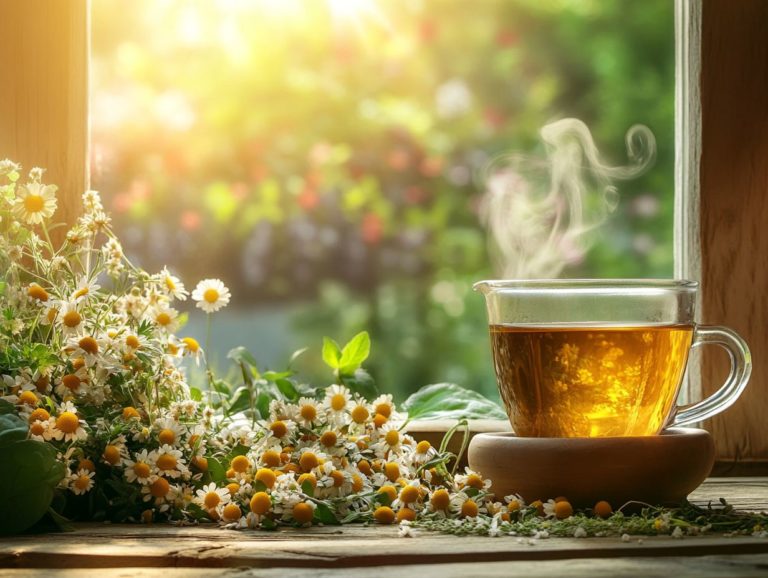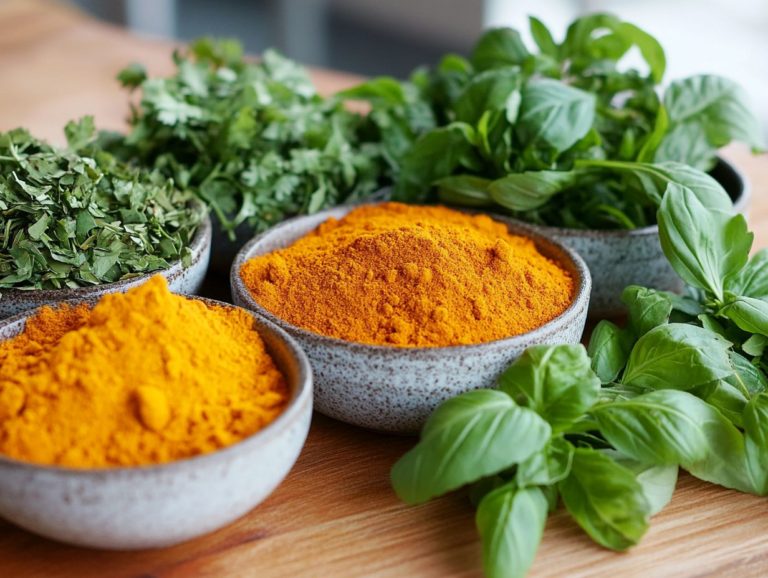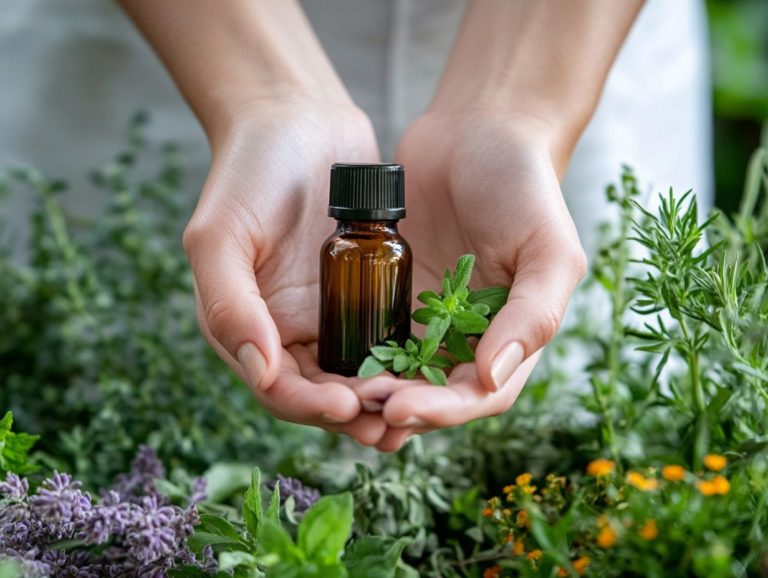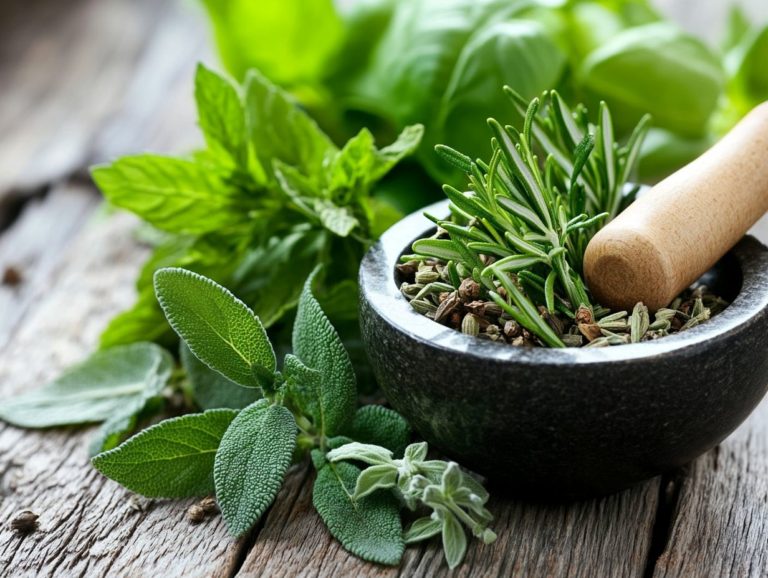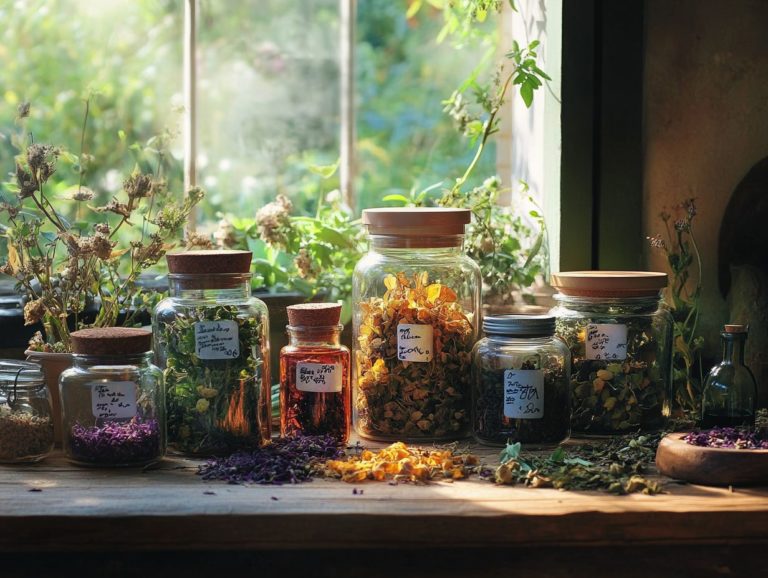Can I Grow My Own Herbs for Remedies?
Growing your own herbs opens up a treasure trove of benefits, from boosting your health to saving a pretty penny. Start your journey today! This article delves into the advantages of growing a medicinal garden, showcasing popular medicinal herbs and the ideal conditions for their growth. You ll discover how to harvest and store herbs to maintain their maximum potency, along with simple recipes for crafting effective herbal remedies right in your own kitchen.
You ll also find creative culinary uses for your homegrown herbs and learn about unique varieties that can enhance your cooking. Immerse yourself in this journey to elevate your gardening experience and reap the many rewards it offers!
Contents
- Key Takeaways:
- Benefits of Growing Your Own Herbs
- Choosing the Right Herbs to Grow
- How to Grow Herbs for Remedies
- Harvesting and Storing Herbs
- Making Remedies from Homegrown Herbs
- Other Uses for Homegrown Herbs
- Frequently Asked Questions
- Can I Grow My Own Herbs for Remedies?
- What are the benefits of growing my own herbs for remedies?
- Which herbs are best for growing for remedies?
- Do I need a large garden to grow herbs for remedies?
- What is the best way to care for my herb plants?
- Can I use my herbs for remedies right away after harvesting?
Key Takeaways:
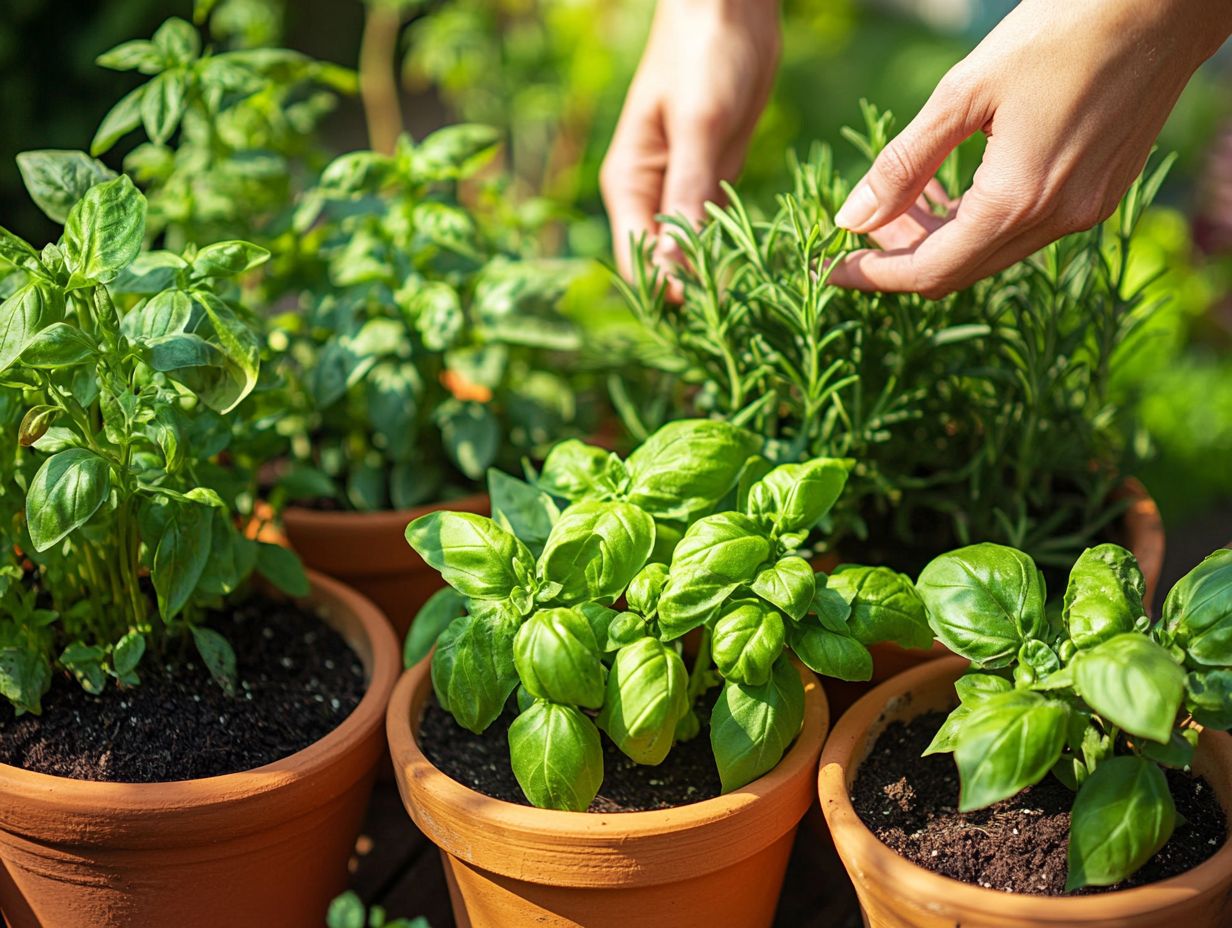
Benefits of Growing Your Own Herbs
Growing your own herbs enriches your health and finances. With herbs like Echinacea, Chamomile, and Lavender, you can create delicious meals and access natural remedies for various uses.
This sustainable practice supports your family’s wellness and promotes food preservation. It allows you to infuse unique flavors and healing properties directly into your kitchen. Moreover, it fosters a closer bond with nature through seasonal gardening, encouraging a holistic approach to your overall health and well-being.
Health and Cost Benefits
The health benefits of growing your own herbs are truly remarkable! You gain access to fresh, potent plants that can elevate your natural medicine cabinet and improve family wellness.
By growing herbs like Garlic and Sage, you tap into their extraordinary therapeutic properties while enjoying substantial savings compared to purchasing store-bought remedies. Garlic, celebrated for its immune-boosting qualities and ability to lower blood pressure, can effortlessly be grown in your home garden, providing a continuous supply for effective herbal treatments. Additionally, you can explore crafting your own herbal remedies at home for even more benefits at a fraction of the cost of commercial options.
Likewise, Sage, known for its antimicrobial effects and digestive support, serves as a valuable ally in your holistic health journey. Rather than relying on pricey supplements, nurturing a small herb garden allows you to take charge of your wellness while keeping your budget in check and enjoying the beauty of gardening.
Choosing the Right Herbs to Grow
Picking the right herbs is key to a successful garden. With a diverse array of popular medicinal herbs like Bee Balm, Yarrow, and Elderberry at your fingertips, thoughtful planning allows you to introduce unique varieties that enhance your garden’s diversity and are often hard to find in stores.
This intentional selection enriches your garden and broadens the culinary and medicinal possibilities within your home, encouraging the growing techniques needed for success.
Popular Medicinal Herbs
Consider adding some of the most popular medicinal herbs to your garden, such as Echinacea, Chamomile, Lavender, Garlic, and Sage. These herbs are celebrated for their unique properties and many health benefits, contributing to your family s health needs.
These herbs thrive in your home garden and act as vital components in various natural remedies and herbal extracts. For instance, Echinacea is particularly effective for boosting your immune system and can be brewed into a delightful tea to help fend off colds while enhancing your knowledge about herbal medicine.
Chamomile, well-known for its calming effects, can effortlessly be infused into a soothing nighttime drink or used in topical applications to alleviate skin issues.
Lavender, often admired for its enchanting aroma, possesses healing properties that can ease anxiety and enhance sleep quality. It makes a wonderful addition to sachets or essential oil blends that reflect the beauty of gardening.
Garlic serves as a flavorful culinary staple while also being a potent antimicrobial agent. You can incorporate it into homemade extracts or consume it raw for its impressive health benefits.
Sage, with its anti-inflammatory qualities, can be brewed into teas or made into poultices for soothing various ailments. Each of these herbs requires minimal maintenance and thrives in well-drained soil while receiving plenty of sunlight. They are perfect for anyone eager to create their own herbal tea garden through seasonal growth and diligent plant care.
How to Grow Herbs for Remedies
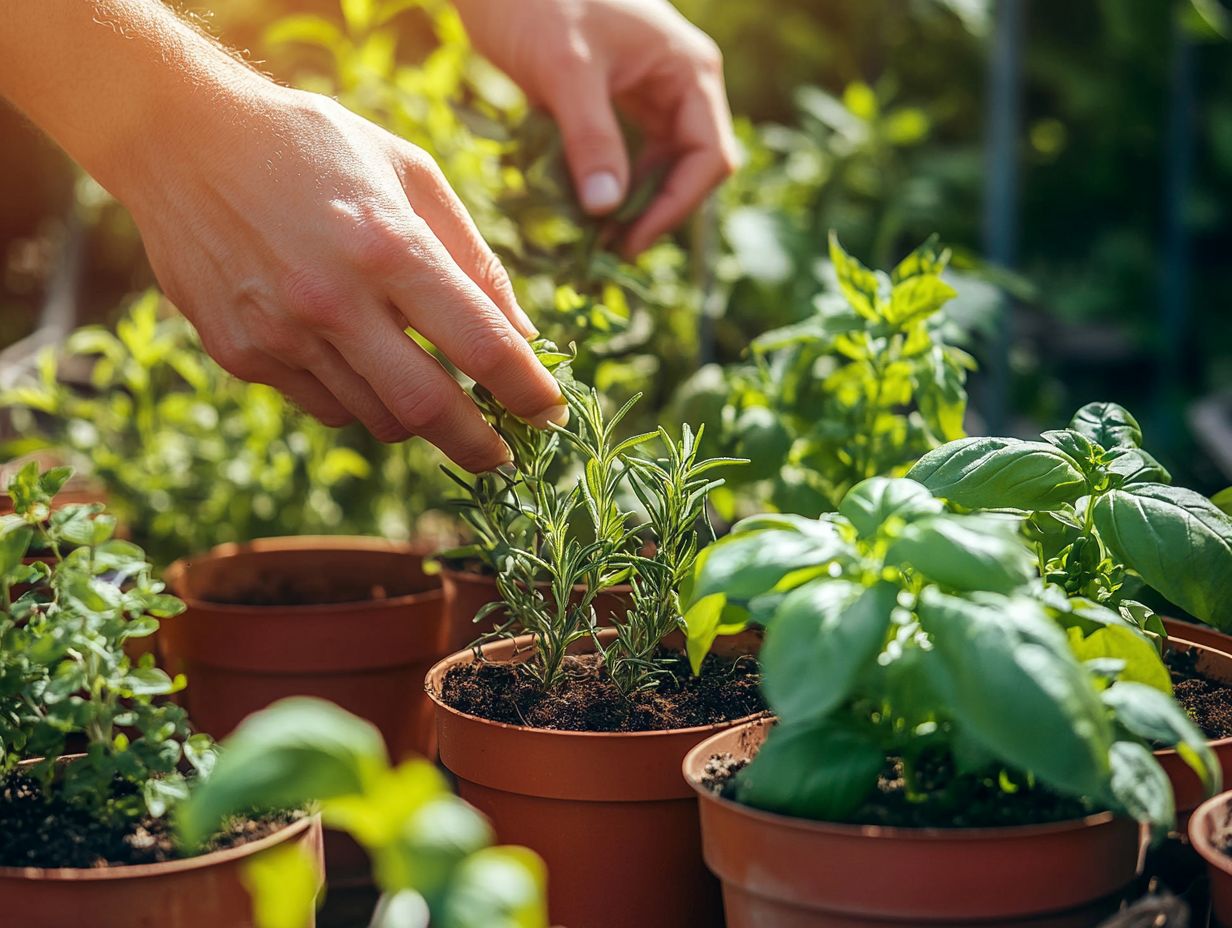
To grow herbs effectively, understand their optimal conditions. Focus on sunlight exposure, soil quality, and water needs. These elements play a vital role in the health and potency of your plants, ultimately impacting your homemade remedies.
By timing your seed sowing appropriately and practicing diligent plant care, you can foster a flourishing medicinal garden brimming with herbs like Mullein and Tulsi. They will be perfectly primed for harvesting when you need them the most for natural medicine.
Best Growing Conditions
Herbs need specific growing conditions to thrive. This variability highlights the necessity of customizing the environment to cater to their unique needs. Consider proper gardening advice and seasonal growth patterns.
For instance, many herbs flourish best in a temperature range of 65-70 F during the day, with slightly cooler nights to foster robust growth and enhance their medicinal benefits. Keeping humidity levels between 40-60% is crucial, helping maintain the right moisture balance without encouraging mold or fungus.
Soil pH is another vital consideration. Most herbs thrive in moderately acidic to neutral soils, ideally within the 6.0 to 7.0 range. This supports their growth and medicinal properties. By meticulously attending to these factors, you can cultivate a nurturing habitat that enhances the vitality and flavor of your herbs, enriching your culinary dishes.
Harvesting and Storing Herbs
Harvesting and storing herbs correctly is essential for preserving their potency and efficacy. This ensures your homegrown medicinal herbs remain effective for both culinary and health purposes, especially for creating herbal salves.
By employing proper techniques during the harvesting process, you can maintain the plant’s beneficial properties. This allows you to fully enjoy the advantages of your herbs in homemade remedies and herbal salves that support your family’s wellness.
This valuable knowledge aids in successful food preservation and enriches the overall experience of your family garden.
Start planting today to cultivate your own wellness with these amazing herbs!
Proper Techniques for Maximum Potency
Proper harvesting techniques are crucial for maximum potency.
They help preserve the beneficial properties of your plants.
Timing is essential; harvesting during the flowering stage typically yields a more concentrated array of active compounds, enhancing the potency of your herbal treatments.
Different methods whether you choose to hand-pick leaves, cut stems, or utilize specialized tools can significantly impact the quality of your harvest as you develop your gardening skills.
For example, cutting stems at the base encourages new growth and ensures a sustainable supply while preserving essential oils and fragrances, which are crucial for effective herbal tinctures.
When preparing herbal tinctures or homemade remedies, the choice between fresh and dried herbs can dramatically affect how the herbs release their benefits, influencing both flavor and medicinal effectiveness.
By employing the right techniques, you can truly enhance the healing potential of your herbal preparations, creating a valuable resource for your family s health.
Making Remedies from Homegrown Herbs
Creating remedies from your homegrown herbs allows you to develop effective herbal treatments specifically designed for your family’s health needs.
This transforms your medicinal garden into a potent source of natural medicine and educational resources in herbal medicine.
By harnessing the benefits of herbs like Lavender and Chamomile, you can make soothing tinctures and calming salves that address a range of ailments.
This not only adds beauty to your gardening experience but also enhances your flower arrangements.
This approach enriches your family’s well-being and offers an educational journey into the world of herbal medicine, including online courses for further learning.
Simple Recipes and Instructions
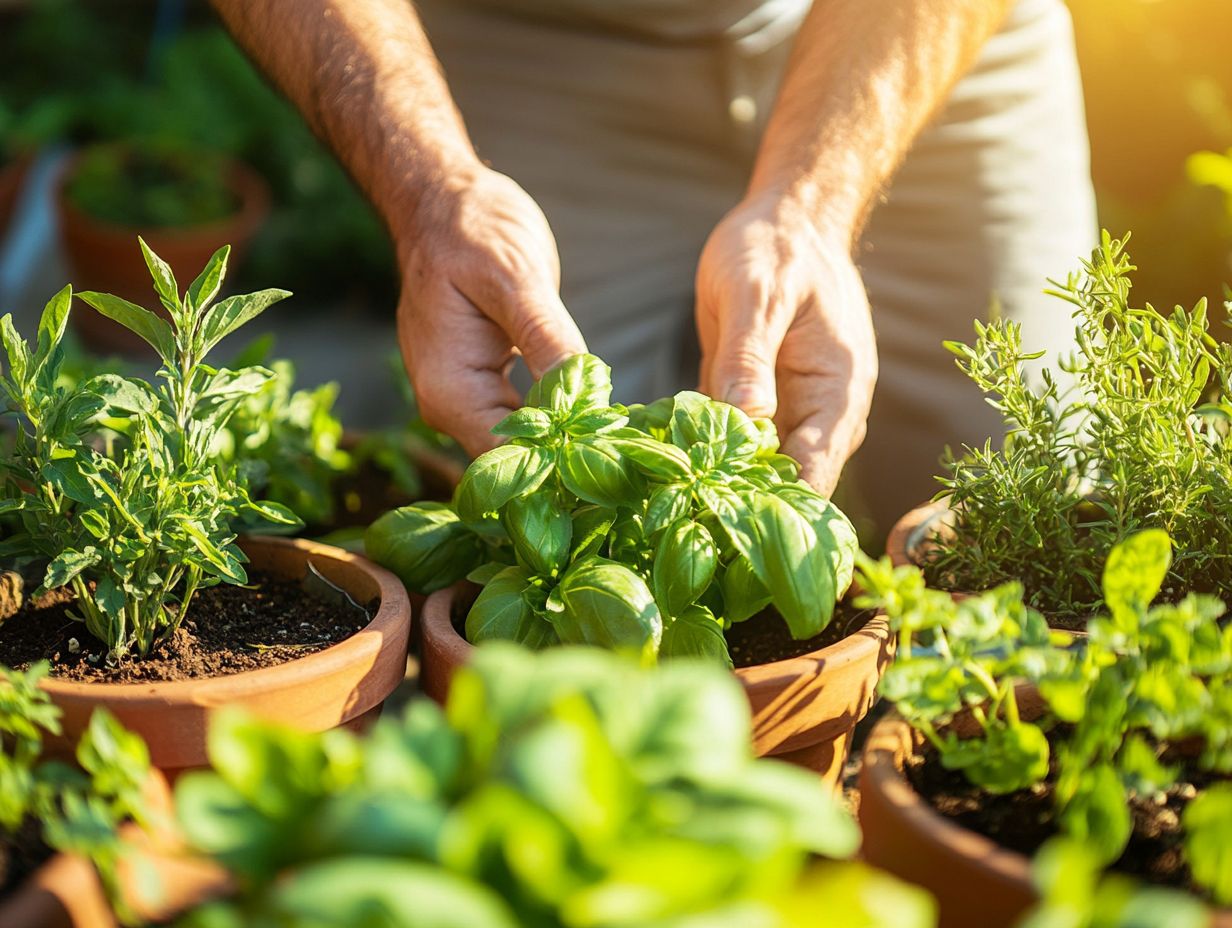
Creating simple recipes for herbal salves and tinctures offers a rewarding opportunity to make the most of your homegrown herbs in homemade remedies.
With a dash of creativity and a sprinkle of patience, you can easily learn to unlock the potent properties of nature’s bounty.
This journey not only empowers you to take charge of your health but also fosters a deeper connection with the very plants you nurture, enhancing your understanding of holistic health.
Whether your interest lies in crafting soothing salves infused with the calming essence of lavender or invigorating tinctures that harness the immune-boosting qualities of echinacea, the possibilities are virtually limitless in the realm of herbal medicine.
By following clear and straightforward steps, you can easily transform these everyday herbs into effective, natural remedies tailored to your needs.
Get started today and transform your homegrown herbs into natural remedies!
Other Uses for Homegrown Herbs
Homegrown herbs provide a wealth of benefits that extend far beyond their medicinal qualities.
They enrich your culinary endeavors and enhance various household applications, including decorative uses with edible flowers.
Consider culinary herbs like sage and garlic, which can elevate your dishes to new heights.
Edible flowers not only brighten your garden but also add a vibrant touch to your plate, blending aesthetics with delicious flavors.
These versatile plants not only beautify your gardening space but also play a vital role in promoting family wellness through nutritious and delightful meals.
Culinary and Household Applications
Herbs play an important role in both culinary and household realms. Unique varieties like Borage and Stinging Nettle offer a wealth of flavors and benefits.
When you think about elevating your dishes, these herbs can transform everyday meals into something truly remarkable. For example, Borage leaves have a refreshing cucumber-like flavor, making them perfect for salads or as an elegant garnish in cocktails.
Stinging Nettle, often overlooked, can be a delightful addition to your kitchen repertoire. You can craft a nutritious pesto a type of sauce filled with fresh herbs and nuts or enhance soups with its rich flavor.
But the magic of these herbs extends beyond cooking. Borage flowers add beauty to your space and can be infused in water to create a natural air freshener. Additionally, dried Stinging Nettle works as an eco-friendly cleaning agent, adding a touch of sustainability to your home.
By integrating these versatile herbs into your lifestyle, you cultivate a sustainable approach that enriches both your culinary adventures and daily routines.
Frequently Asked Questions
Can I Grow My Own Herbs for Remedies?
Growing your own herbs is a fun and rewarding experience! Many people prefer to grow their own herbs to ensure they are organic and free of harmful chemicals.
What are the benefits of growing my own herbs for remedies?
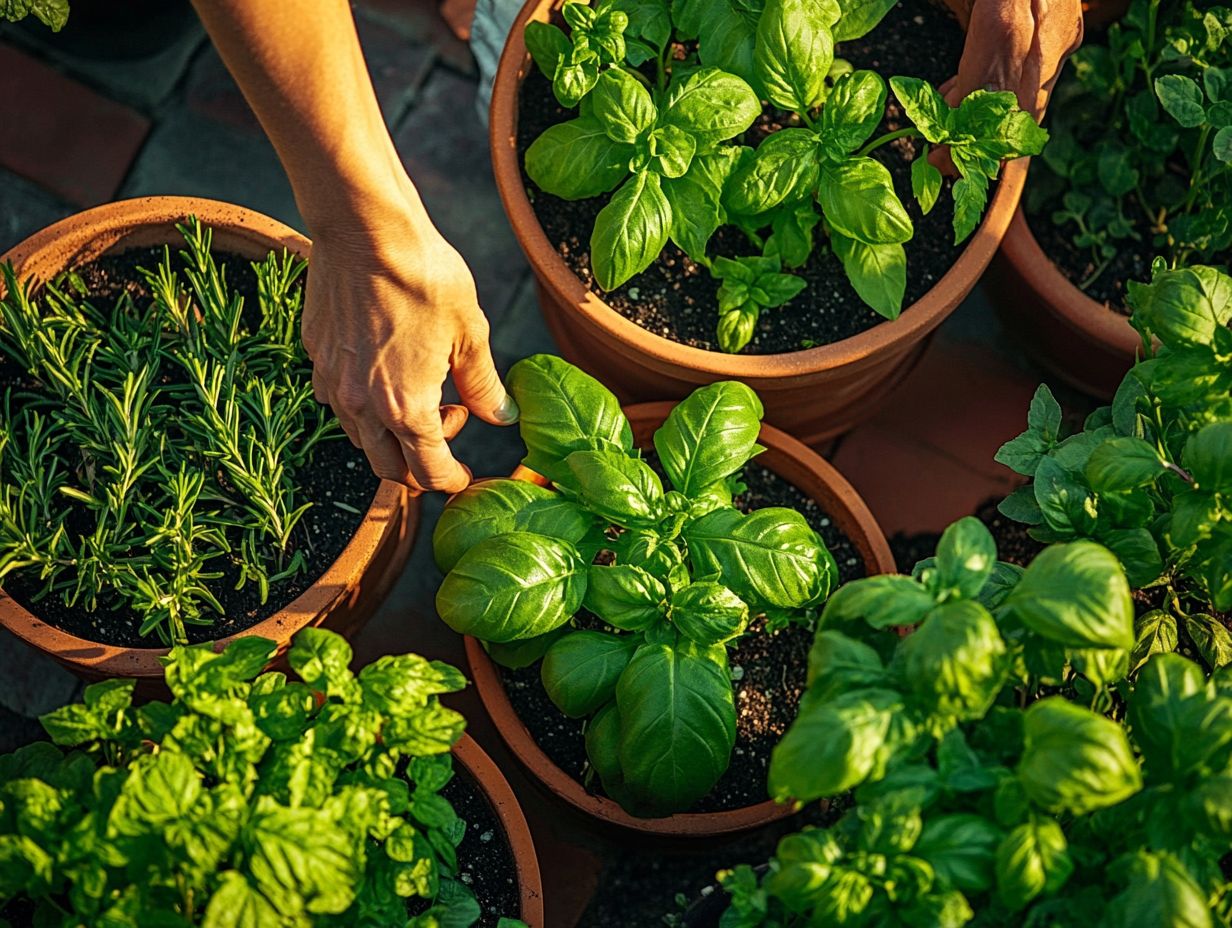
There are several advantages to growing your own herbs for remedies:
- You control the quality and purity of the herbs.
- It can save you money in the long run compared to buying herbs from a store.
- Growing your own herbs can be a therapeutic and enjoyable hobby.
Which herbs are best for growing for remedies?
Many herbs are great for growing for remedies. Some popular options include chamomile, lavender, peppermint, and rosemary. It ultimately depends on the remedies you’re looking to make and the herbs available to you.
Do I need a large garden to grow herbs for remedies?
No, you don t need a large garden! Many herbs can thrive in small containers or even indoors. As long as they have access to sunlight and proper care, they can flourish in smaller spaces.
What is the best way to care for my herb plants?
The best way to care for your herb plants is to research the specific needs of each type. Generally, they need plenty of sunlight, well-draining soil, and regular watering. It’s important to keep an eye out for pests and diseases and take preventative measures.
Can I use my herbs for remedies right away after harvesting?
It’s recommended to allow your herbs to dry completely before using them for remedies. This helps preserve their potency and makes them easier to store. You can dry them by hanging them upside down in a well-ventilated area or using a dehydrator.
Start your herb garden today and enjoy the benefits of fresh remedies right at home!

